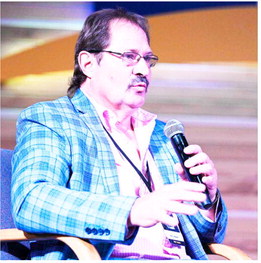Beach Recounts His Road To Freedom As Probation Nears End


Barry Beach, the man who spent 30 years in prison for a murder he says he didn’t commit, will soon finish the commuted probationary sentence issued by a former Montana governor who once argued for his lifetime imprisonment.
Speaking on Sept. 18 at a three-day conference presented by Montana Free Press, Beach said his 10-year probationary sentence, issued by former Democratic Gov. Steve Bullock in 2015, was ending soon.
“The notification came out this morning on the Victim Information Network that Barry Beach is about to be released from probation,” he told an audience at Montana State University. The announcement drew applause. VINE, as the network is known, indicates that Beach’s probation ends Nov. 17.
Beach, who turns 63 this year, was sentenced in 1984 to 100 years in prison for the 1979 murder of Kimberly Nees. It was a crime that Beach confessed to years later during a seven-hour interrogation in Louisiana. His stepmother, fearing that her daughter was going to run away with Beach in 1983, told the Ouachita sheriff’s department that Beach was a Montana murder suspect. After four days in jail and a seven- hour interrogation, Beach made his confession but later recanted.
After police brought him back to Montana, Beach was tried in Roosevelt County. The special prosecutor in the 1984 trial was Marc Racicot, who was later twice elected as Montana’s Republican governor in the 1990s. Racicot still maintains that Beach is guilty, and argued in 2014 against granting Beach clemency.
Several details about the murder didn’t point to Beach. A bloody handprint on the side of the victim’s vehicle wasn’t a match for Nees or Beach. The victim had been dragged 100 yards to the Poplar River, but footprints along the path weren’t a match for Beach.
“There are no forensic matches in any way, any shape, any form,” Beach said. “But my beloved Marc Racicot has stated several times that I am not credible because my story has changed. Let’s bring that focus into the state of Montana and their focus of the bloody palm print that was found on the side of the vehicle where the assailant drug the victim out of the pickup. What the forensic science proves is when they drug the victim out of the pickup, they put their palm on the side of the cab to pull.
“And there’s a bloody palm print the state of Montana and Marc Racicot has changed their theory on that palm print four different times. Now, 20, 40, some years later, the belief is that palm print is absolutely of no value, when the FBI, the Roosevelt County sheriff and every other law enforcement in the state for 15 years used that palm print to eliminate suspects, except for me, by the way. That’s my point about forensic science. We need to work on our court system and get back to the fundamentals of what we believe our court system is supposed to do.”
Centurion Ministries, a nonprofit organization that takes up cases for what it says are the wrongly convicted, attracted media attention to Beach’s case in 2008. That year, the investigative NBC news program “Dateline” featured the Barry Beach story and raised questions about whether Beach was the killer, based primarily on evidence presented by Centurion, which at the time had succeeded in freeing 52 people.
He was never exonerated, but eventually Beach inspired a change to Montana law granting the governor sole authority on commutations. The change limited the power of the state parole board, which had blocked a previous attempt by Beach seeking parole.
Bullock, who as attorney general argued against Beach’s release from prison, commuted Beach’s sentence in 2015 to credit for time served, plus 10 years probationSpeaking on Sept. 18, Beach credited several Democrats for persuading Bullock to make the commutation.
“I’m extremely grateful to them because they’re the ones who rallied the press and convinced Gov. Bullock to utilize his power,” Beach said.
Beach appeared at Montana Free Press Fest as a session- ending keynote speaker with long-time friend Marcia Price. Price was part of a group of volunteers who worked for Beach’s release a decade ago, then helped him transition to life on the outside.
Centurion in 2008 attempted to get Beach another trial based on new evidence. The request was denied in a lower court, but the Montana Supreme Court in 2009 ordered that the request for a new trial be reconsidered. In 2011, a different district court judge reviewed the new evidence and threw out Beach’s original conviction. That December, Beach was released from custody, but the state Supreme Court in 2013 overturned his release, ordering him back to prison, after 18 months on the outside, to serve out his life sentence.
One supporter offered Beach $10,000 and a car to drive into Canada rather than return to prison. But Beach said he had to surrender to the state.
“I had made a promise to Jim McCloskey of Centurion Ministries that no matter what the outcome was, he had my word I would turn myself in if I had to,” Beach said. “It’s never been so hard in my life to keep a promise.”
Price was with Beach at a Billings bank when they learned that he had to turn himself in immediately. He had been living as a free man, with a car, bank account and steady employment as a handyman. They went to the sheriff’s office so Beach could surrender.
“They were standing there waiting for us, and he started taking off his belt and his eyeglasses, and gave me the car keys,” Price told the audience. “And then he came back and he said, ‘No, I’m not gonna let him do that to me.’ And he put his belt back on and his glasses, and he said, they’ll take him away from me, but I don’t want to look like that when I walk in.’” It was May 2013 when Beach turned himself in. He remained in prison serving the same 100-year sentence he received in 1984, until November 2015 when Bullock granted Beach clemency.
Beach finished his talk by recommending changes to the corrections system. He said that no prison stay should be shorter than five years.
“If you’re going to spend the taxpayers’ dollars to send somebody to prison, make sure they’re going to stay there for at least five years. If they are not there between five to 10 years, day for day, prison doesn’t hit them,” Beach said. “These people that you’re sending into prison, and they’re doing a year and a half, two years, three years, and getting out on parole and coming back and doing six months and getting out on parole, you’re wasting taxpayers’ money.”
Prisoners need to be incarcerated long enough to reflect on what they’ve lost, Beach said. At five years, a prisoner’s contact with the outside world fade away, he told the audience.
“I do not believe we should ever, ever, ever keep anybody in prison for more than 25 years,” Beach added. “You are wasting taxpayers’ dollars if you’re fighting to keep somebody beyond 25 years. That means that the prison system has not reformed them. And if you can’t reform them within 25 years, you have failed, and you don’t need my money to try again for the next 20 years.”



